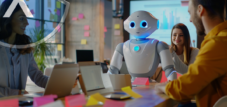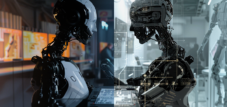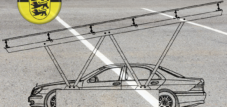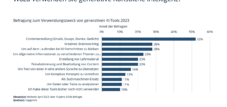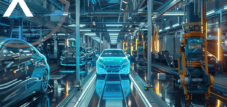AI / KI / GenKI / GenAI: Artificial and Generative Intelligence in Mechanical Engineering – Planning & Agency Consulting from Baden-Württemberg (BaWü)
Language selection 📢
Published on: August 27, 2024 / update from: August 27, 2024 - Author: Konrad Wolfenstein

Artificial and Generative Intelligence in Mechanical Engineering – Planning & Agency Consulting from Baden-Württemberg (BaWü) – Image: Xpert.Digital
📈🔍 Production optimization through AI: opportunities and potential in mechanical engineering
🔍 Artificial intelligence in mechanical engineering: Planning and consulting from Baden-Württemberg
Technological developments in recent years have fundamentally changed the way companies work and produce. The integration of artificial intelligence (AI) and generative artificial intelligence (GenAI) is playing an increasingly important role, particularly in mechanical engineering. These innovative technologies not only offer opportunities to optimize production processes, but also to develop new products and tap into previously unused potential. Companies in Baden-Württemberg, one of Germany's leading industrial centers, are at the forefront of this transformation.
🤖 The importance of AI in mechanical engineering
Artificial intelligence is no longer a topic of the future. It has established itself as a decisive competitive factor in many areas. In mechanical engineering, AI enables the automation and improvement of numerous processes. These include, among other things, the predictive maintenance of machines, the optimization of supply chains and quality control in production.
A particularly exciting aspect is AI's ability to analyze large amounts of data and derive patterns from it that are not immediately recognizable to humans. This leads to significantly increased efficiency and productivity. By using machine learning, machines can continually improve their performance and adapt to changing conditions.
🚀 Generative AI: A new approach to innovation
In addition to classic AI, which is based on the processing and analysis of data, generative artificial intelligence is also becoming increasingly important. GenAI is able to independently develop new designs, concepts or even entire production processes. This ability to generate something new opens up completely new possibilities in mechanical engineering.
An example of this is the use of GenAI in product development. Engineers and designers can use this technology to create innovative new solutions that were previously unthinkable. Generative AI analyzes existing data, learns from previous designs and combines them to produce new, often surprising results. This can lead to both a reduction in development time and a significant reduction in costs.
⚙️ Challenges in implementing AI and GenAI
Despite the obvious benefits, many companies face significant challenges when it comes to implementing AI and GenAI. One of the biggest hurdles is integrating these technologies into existing systems. Existing IT infrastructures are often not designed to handle the enormous amounts of data required to effectively use AI.
Another problem is the lack of skilled workers. Implementing AI requires not only technical knowledge, but also a deep understanding of the specific requirements of mechanical engineering. Companies must therefore invest in the further training of their employees or bring in external expertise in order to successfully implement these technologies.
📈 Advice and planning: success factors from Baden-Württemberg
In Baden-Württemberg, numerous consulting agencies and companies have specialized in supporting mechanical engineering in the implementation of AI and GenAI. These experts not only offer technical know-how, but also strategic advice. They help companies develop tailor-made solutions tailored precisely to their needs.
Planning plays a central role here. Before AI and GenAI can be introduced, clear goals must be defined. It is crucial to identify the right use cases and create a roadmap for implementation. It is important to consider both short-term and long-term goals in order to get the maximum benefit from investments in AI.
🏆 Practical examples: Successful implementation of AI in mechanical engineering
In practice, there are already numerous examples of how AI and GenAI are successfully used in mechanical engineering. One example is the use of AI for predictive maintenance. By continuously monitoring machine data, potential problems can be identified early and resolved before expensive failures occur. This not only increases the availability of the machines, but also reduces operating costs.
Another example is the optimization of production processes through AI. In a connected factory, AI continuously analyzes production data and adjusts processes in real time to maximize efficiency and quality. It takes into account various factors such as machine utilization, material availability and energy consumption.
🌟 The future of AI and GenAI in mechanical engineering
The development of AI and GenAI is only just beginning, and the possibilities offered by these technologies are far from being exhausted. It is expected that their application in mechanical engineering will continue to expand in the coming years. In particular, the increasing networking and digitalization of production environments – keyword Industry 4.0 – will further increase the importance of AI and GenAI.
It is to be expected that the technologies will become more and more specialized and adapted even more closely to the specific requirements of mechanical engineering. For example, autonomous production systems could be created that optimize themselves and react to changes in real time. The development of completely new products designed by AI will also play an increasingly important role.
💡 Artificial intelligence and generative AI in mechanical engineering
The integration of artificial intelligence and generative AI in mechanical engineering offers enormous potential for innovation and increased efficiency. Companies in Baden-Württemberg, as one of the industrial heartlands of Germany, are excellently positioned to use these technologies and strengthen their competitiveness. Through careful planning, strategic advice and the involvement of experts, the challenges can be overcome and the benefits can be fully exploited. The future of engineering will undoubtedly be shaped by AI – and those who embrace this development early will be at the forefront.
📣 Similar topics
- 🤖 Artificial intelligence in mechanical engineering: A revolution
- 🔧 Generative AI: The key to new innovations
- 🏭 Baden-Württemberg: Pioneer in digital transformation
- 🚀 Automation and increased efficiency through AI
- 📈 Future vision: AI and Industry 4.0 in mechanical engineering
- 💡 Strategies for the successful implementation of AI and GenAI
- 📊 Data analysis and pattern recognition: The AI advantage
- 🛠️ Challenges and solutions for AI integration
- 🤝 Advice and planning: recipes for success for companies
- 💻 Practical examples: AI in use in mechanical engineering
#️⃣ Hashtags: #ArtificialIntelligence #GenerativeKI #Mechanical Engineering #Industrie40 #BadenWürttemberg
📌 Other suitable topics
Our recommendation: 🌍 Limitless reach 🔗 Networked 🌐 Multilingual 💪 Strong sales: 💡 Authentic with strategy 🚀 Innovation meets 🧠 Intuition
At a time when a company's digital presence determines its success, the challenge is how to make this presence authentic, individual and far-reaching. Xpert.Digital offers an innovative solution that positions itself as an intersection between an industry hub, a blog and a brand ambassador. It combines the advantages of communication and sales channels in a single platform and enables publication in 18 different languages. The cooperation with partner portals and the possibility of publishing articles on Google News and a press distribution list with around 8,000 journalists and readers maximize the reach and visibility of the content. This represents an essential factor in external sales & marketing (SMarketing).
More about it here:
🤝 Increase competitiveness through AI in individual and small series production
😊 The use of artificial intelligence (AI) in individual and small series production has enormous potential to optimize production processes and increase the competitiveness of companies. In today's industry, which is increasingly characterized by digital transformations, AI is enabling a profound change in traditional manufacturing processes. This section highlights the most important aspects and benefits of implementing AI in one-off and small-batch production and supplements these with additional information and innovative ideas.
🤖 Artificial Intelligence in Manufacturing: An Overview
The manufacturing industry is facing a new era in which artificial intelligence plays a central role. Traditional production methods based on human expertise and manual processes are increasingly reaching their limits. This is where AI comes into play: It makes it possible to analyze complex amounts of data, recognize patterns and make decisions in real time. AI opens up new possibilities, especially in individual and small series production, where production often has to be variable and adaptable.
💡 Potential and challenges
Implementing AI in production promises significant increases in productivity. According to a study commissioned by the Federal Ministry for Economic Affairs and Energy, the additional gross value added through the use of AI in Germany could amount to around 31.8 billion euros over the next five years. Applications such as predictive analytics, intelligent assistance systems and intelligent automation are considered particularly promising.
However, there are also challenges. Many companies do not have the necessary amounts of data or the quality of data to be able to use AI effectively. In addition, there is often a lack of a basic understanding of the technology and the concepts associated with it. This means that many decision-makers are hesitant to implement AI in their production processes.
⚙️ Automated Machine Learning (AutoML)
A significant development in the field of AI is Automated Machine Learning (AutoML). This technology automates many of the complex and time-consuming steps that previously had to be performed manually. In production, AutoML offers the opportunity to make processes faster and more efficient by integrating domain knowledge and thus specifically addressing the requirements of the manufacturing industry.
A major advantage of Automl is the “democratization” of machine learning. As a result, non-programmers can also benefit from the advantages of machine learning, since the effort for data preparation and model formation is minimized. This is particularly valuable in individual and small series production, where flexibility and adaptability are crucial.
🔧 AI-supported process optimization
Another important area of application for AI in manufacturing is data-based process optimization. By using machine learning models, companies can improve the quality of their products, reduce machine downtimes and make production processes more efficient. Especially in small series production, where production volumes often fluctuate, AI can help to stabilize and optimize processes.
The future of process optimization lies in the development of fully and semi-autonomous systems capable of adjusting production parameters based on predictions. These systems could enable companies to improve their production processes even when there is a shortage of skilled workers.
📜 Certification of AI-supported processes
One of the greatest hurdles for the broad introduction of AI in production is the lack of certification. Since AI systems are often viewed as a “black box”, it is difficult for companies to ensure the transparency, explanability and traceability of these systems. However, these aspects are crucial to maintain certification and thus ensure the safety and reliability of the production processes.
There are currently no set standards for the certification of AI-supported processes in production. This represents a major obstacle that must be overcome to further advance the use of AI in industry.
🛠️ Application examples
A particularly exciting application example for the use of AI in manufacturing is the detection of tool wear using structure-borne sound sensors. By analyzing the sound waves generated by the tool, AI can monitor the condition of the tool in real time, thereby maximizing the life of the tools. This not only reduces costs but also improves the quality of the parts produced.
Another example is the use of deep learning to optically detect tool wear. A neural network is trained to evaluate the wear condition of a tool based on microscopic images. This technology enables objective and standardized assessment of tool condition, further increasing production efficiency and accuracy.
🚀 AI offers numerous possibilities
The use of artificial intelligence in individual and small series production has the potential to fundamentally change the production landscape. From process optimization to quality control to predictive maintenance – AI offers numerous opportunities to increase the efficiency and competitiveness of companies. Despite existing challenges, such as the need for better data quality and the lack of certification, the future of AI in manufacturing is bright. Companies that invest in these technologies at an early stage will reap the long-term benefits and strengthen their position in the market.
📣 Similar topics
- 🤖 Artificial intelligence is revolutionizing the manufacturing industry
- 🚀 Optimization through AI in small and individual series production
- 💡 New possibilities through AI in modern production
- 🎯 AI-controlled production: opportunities and challenges
- 📊 Use automated machine learning in production
- 🔧 Process optimization through data-based AI solutions
- 📜 Certification of AI applications in production
- 🔎 Application examples: AI and tool monitoring
- 🌐 Advantages of AI in manufacturing technology
- 🔮 Future of manufacturing: AI as a key factor
#️⃣ Hashtags: #ArtificialIntelligence #Manufacturing #ProcessOptimization #Automation #TechnologicalRevolution
We are there for you - advice - planning - implementation - project management
☑️ SME support in strategy, consulting, planning and implementation
☑️ Creation or realignment of the digital strategy and digitalization
☑️ Expansion and optimization of international sales processes
☑️ Global & Digital B2B trading platforms
☑️ Pioneer Business Development
I would be happy to serve as your personal advisor.
You can contact me by filling out the contact form below or simply call me on +49 89 89 674 804 (Munich) .
I'm looking forward to our joint project.
Xpert.Digital - Konrad Wolfenstein
Xpert.Digital is a hub for industry with a focus on digitalization, mechanical engineering, logistics/intralogistics and photovoltaics.
With our 360° business development solution, we support well-known companies from new business to after sales.
Market intelligence, smarketing, marketing automation, content development, PR, mail campaigns, personalized social media and lead nurturing are part of our digital tools.
You can find out more at: www.xpert.digital - www.xpert.solar - www.xpert.plus







